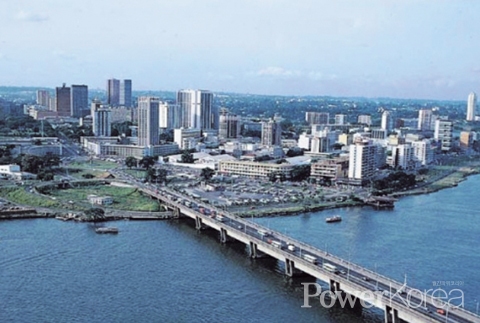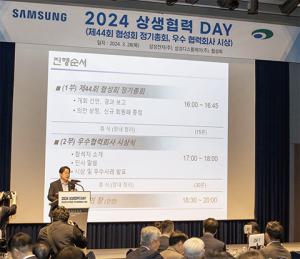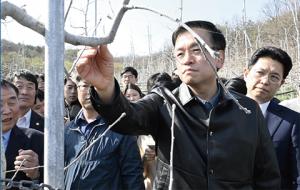 |
||
| ▲ H.E Sylvestre Kouassi BILE | ||
“Cote d’Ivoire, also known as Ivory Coast, has achieved a vibrant growth in investment and production on the back of political and economic stability and development since its independence.”
Located in the intertropical zone, Cote d’Ivoire, a country in West Africa, covers an area of 322 463Km2. It is limited to the North by Burkina Faso and Mali, to the South by the Atlantic Ocean, to the East by Ghana and to the West by Guinea and Liberia. Its relative economic success is due to its natural and human potentialities.
The Ivorian relief is generally flat and composed of plains and plateaux, with the exception of the west where there are some mountains. From this relief, it appears that 97% of the land in Cote d’Ivoire is arable.
Power Korea Media Group sat down with Cote d’Ivoire Amb. H.E. Sylvestre KOUASSI BILE at the Embassy of Cote d’Ivoire to hear about its investment environment for Korean investors Cote d’Ivoire offers as well as regarding mutual cooperation ways in the unprecedented pandemic era including Cote d’Ivoire’s leading role in the African continent etc. –Ed.
First of all, how is the significance of Cote d'Ivoire Independence Day 2020 for not only Cote d'Ivoire peoples, but also for the entire African countries in terms of its implications to regional society and nations?
The National Day of Cote d’Ivoire commemorates the independence of this West African country which became a French colony on March 10, 1893, after several attempts of occupation by European explorers since the 15th century.
On the occasion of the National Day, festivities are organized throughout the national territory and in the diplomatic missions abroad.
The memory of the Cote d’Ivoire accession to independence evokes, for us Ivorians, a solemn moment of gathering around the strong values of the Republic and reminds our collective memory, the unwavering ties that found our common will to live together and to assume our destiny in solidarity and a sense of responsibility.
After forging its national identity and unity, Cote d’Ivoire was able to join other nations for the creation of regional institutions to face effectively common challenges.
How are expected the two nations cooperation to tackle pandemic era issues in the years to come in terms of mutual cooperation to prevent such pandemic?
Solidarity and cooperation are the most powerful weapon against epidemics. The focus must now be on the most urgent medical, economic and political challenges resulting from the pandemic to address deficiencies to improve pandemic risk preparedness and response.
Public health systems in developing countries, particularly in African countries such as Cote d'Ivoire, are fragile. Helping them to cope better with Covid-19 is a top priority in the cooperation between our countries. Korea can provide more material, technical and human support to Cote d’Ivoire. The Korean method of combating Covid-19 is a school case for all countries so it can share that experience of managing Covid-19 with Cote d’Ivoire and help it to ensure a faster response to health emergencies and create national stockpiles of equipment for the fight against epidemics.
We need to coordinate macroeconomic policies between our two countries, work to improve trade between us and encourage stability and fluidity of industrial and supply chains.
It is essential to continue cross-border trade in medical equipment, agricultural products and other goods and services to enable effective management of this crisis, to help reduce supply and aggregate demand shocks, and to enable a timely economic recovery. Faced with an unprecedented situation caused by the Covid-19 pandemic, we must join forces to contain the pandemic and prevent its spread.
 |
How is Cote d'Ivoire investment environment for Korean enterprises which are eager to penetrate into African market, taking advantage of Cote d'Ivoire's logistics hub edges etc. and what is background for Cote d'Ivoire to record 7-9% economic growth during last 10 years?
As soon as it gained independence, Cote d’Ivoire opted for state capitalism. Thus, the country is open to foreign investors, but with state participation in the development program and the collection of taxes.
In 2012, the government and the private sector set out to facilitate the formalities for companies wishing to invest in Cote d’Ivoire. Reforms have thus been introduced to better regulate investments, notably, by strengthening the one-stop-shop for investments, managed by the Center for the Promotion of Investments in Cote d’Ivoire (CEPICI).
Placed under the authority of the Prime Minister, CEPICI’s mission is to identify and support investors. Thus, any investor, national or with foreign capital, direct or portfolio, big or small, is invited to declare itself to CEPICI, which one-stop-shop acts as a multi-service cocenter for the accomplishment of the administrative formalities required for creating business. The transition to CEPICI is, however, not a legal requirement.
Progress has been made in terms of starting a business with the removal of the obligatory passage at the notary for any commercial company other than the public limited company, and thanks to the reorganization, in 2012, of the registry of the court where the contractors must immatriculate.
In addition, the cost of setting up a business has dropped considerably since 2013, from about US$ 1 482 to US$ 30. In terms of merchandise trade, Cote d’Ivoire’s supply is as diversified as it is varied. The country’s trade balance is structurally surplus.
However, due to strong GDP growth from 2012, trade has declined due, in particular, to the decline in exports of petroleum products. The main advances have been in cocoa and cashew, but also in agro-industrial products, which include palm oil, soaps, cosmetics, extracts and coffee essence, tobacco, bags and packaging bags and cocoa products.
Cote d’Ivoire, also known as Ivory Coast, has achieved a vibrant growth in investment and production on the back of political and economic stability and development since its independence. With its national competitiveness growing day by day, the country has been setting a great example for countries around the world.
Its economic capital, Abidjan, which is cited as one of the most beautiful cities in Africa, is home to the headquarters of the African Development Bank and has grown into one of the leading cities in the world.
How is the leading role of Cote d'Ivoire & its responsibility within African continent to tackle African issues such as African continent integration, poverty, digital gap, and climate change, to name just a few?
As a country of openness, Cote d’Ivoire has benefited from the massive influx of a large foreign population, most of them from the countries of the subregion, representing about 26% of the population. It is a very entrepreneurial human resource that contribute enormously to Cote d’Ivoire’s economic development through the creation of large plantations, socio-economic infrastructures and the growth of small and medium sized enterprises and small and medium sized industries, which benefits the West African sub-region.
The growth of the Cote d’Ivoire, the largest economy in the sub-region, is fueled by investments in infrastructure and productive sectors that benefit the economy of the entire West African sub-region. With these recent performances, Cote d'Ivoire confirms its status as ECOWAS's leading economy by placing 12th in the World Bank's ranking of the richest countries in Africa. It helps pull its neighbours up, through the signing of partnerships in several economic areas and in the protection of the environment. It has increased its thermal production capacity in recent years to support some countries in the sub-region.
Cote d’Ivoire adheres to all legal instruments for protecting the Environment in Africa and around the world. It respects the essentials of ecological systems and processes, as well as all the commitments made. It was in this context that the International Symposium on the Implementation of Environmental Law in Africa was held in Abidjan, Cote d'Ivoire, from 29 to 31 October 2013 under the theme: Institutional and Financial Mechanisms for the Implementation of Environmental Law in Africa with a view to sustainable development.
Cote d’Ivoire plays its full role in combating all the problems that are undermining Africa through its great contribution within the African Union and ECOWAS, of which it has served as president several times. It is also home to the headquarters of the African Development Bank (AfDB), which is the institution that fights all African problems such as the integration of the African continent, poverty and climate change. Cote d’Ivoire has seen its international stature rising further with a seat on the UN Security Council as a non-permanent member for the term 2018-2019. During its tenure at the United Nations, Cote d’Ivoire defended the interests of all African countries.
 |
Please touch upon Cote d'Ivoire Government's efforts to tackle with Corona 19 virus pandemic in partnerships with other African countries.
The Ivorian authorities have succeeded in effectively containing the spread of the coronavirus thanks to a combination of the following measures: The application of lessons from experience in the fight against the Ebola epidemic, this was based on the principles of speed of action, transparency and border control. Thanks to border controls, Cote d'Ivoire has not experienced any cases of Ebola, although some of its neighboring countries had some cases. Border control is carried out in complicity with neighboring countries and under the regulations of the African Union.
Massive investment in the public health system, transparent sharing of information and fostering civic awareness. The closing of borders, schools, places of leisure like nightclubs especially a great awareness on the respect of the barrier measures and massive screening.
As part of the resumption of flights, the Government issued a decree to institute a declaration form for travel by air, compulsory for all travelers from/to Cote d'Ivoire and adopted practical arrangements which require a series of conditions to be respected by passengers, Ivorian airport officials and by airline companies.
In the framework of the cooperation to tackle COVID-19, Ambassador Sylvestre KOUASSI BILE visited, on Thursday 04 June 2020, in Hanam City, in Gyeonggi Province, the factory of the Korean company SARAMS. This factory manufactures sterilizers that prevent the spread of coronavirus in a room. This very practical sterilizer for hospitals and administrative centers purifies the air by negative pressure and prevents the circulation of the virus in a closed room.The SARAMS Company, designer of this sterilizer, plans to set up a manufacturing unit for this product in Cote d'Ivoire.
This sterilizer could effectively contribute to the fight against the spread of the Coronavirus disease pandemic (COVID-19) in the Republic of Cote d'Ivoire.
How is the prospect of Korean tourists who are eager to explore Cote d'Ivoire in the years to come and please recommend Cote d'Ivoire tourism attractions for Korean travelers?
On the coast, tourists can enjoy the beautiful beaches of the Gulf of Guinea, including the Bay of Sirens. In Grand Bassam, a city listed as a UNESCO world heritage, they will discover a colonial town and will enjoy the beach, Assinie resort is not far away. Various national parks in the country will allow them to discover the local flora and fauna through the Tai National Park, the Mount Nimba Nature Reserve, the Comoe National Park. The waterfall of Mount Tonkui, the sacred forest of Gbepleu and its monkeys, the craftsmen of Korhogo, are some of sites to visit.
The position of Cote d’Ivoire is an asset; centrally located in the heart of West Africa, it is a gateway to that region. The population is affable; their welcoming is great.
COTE D’IVOIRE (Ivory Coast):
The right investment destination
The Ivorian Government has been committed since 2012, with the support of technical partners, in particular the World Bank through the IFC (International Finance Corporation), to the process of improving the business climate through several reforms of the macroeconomic framework and the sectoral framework of activities.
Doing Business is a benchmark from the World Bank which assesses the regulations applicable to private sector companies, in particular to Small and Medium Enterprises, over the 11 stages of their life cycle. Steps presented in the form of the following indicators:
IMPROVEMENT OF THE BUSINESS ENVIRONMENT
What you need to know about the reforms carried out in 2016.
Since 2013, the Ivorian Government has been engaged in a process of constant improvement of the business climate by taking as a benchmark the World Bank Group's Doing Business index relating to the ease of doing business. In the Doing Business 2017 report published on October 25, 2016, Cote d'Ivoire maintains its position at 142nd place in the world. At the level of the continent, it is ranked 17th among 47 African countries.
THE CREATION OF BUSINESSES IN 24 HOURS AT ONLY 30 $
CEPICI's One Stop Shop for Business Formalities (GUFE) allows companies to be set up in 24 hours, at lower costs. From now on, the statutes for companies of the type SARL, SNC, SCS are established by private deeds. Operators have free standard models of statutes under private signature on the CEPICI website. All they have to do is fill them out and have them signed by the parties.
OBTAINING A CONSTRUCTION PERMIT IN 26 DAYS
The Single Window for Building Permits (GUPC) was inaugurated on April 29, 2016. It simplifies and accelerates the procedures for obtaining a building permit.
The GUPC issues the building permit within a maximum period of 26 days in full transparency. The documents to be provided for its issue are available on the website of the Ministry of Construction. www.ministere-construction.ci/gupc
PAYMENT OF TAXES
Cote d'Ivoire has facilitated and simplified the payment of taxes and duties through the institution of a single form for the declaration and payment of taxes and duties. It has also facilitated, accelerated and simplified the refund mechanism for VAT credits by setting up a transparent system which ensures the effective payment of VAT credits in record time.
THE SINGLE WINDOW FOR FOREIGN TRADE
A Single Window for Foreign Trade has been set up to facilitate, accelerate and simplify the formalities required for foreign trade. All the procedures are done online at www.guce.gouv.ci.
SECURING ECONOMIC LIFE
The institution of the prior recourse to amicable settlement, between the parties, by mediation or conciliation strengthens the efficiency of the judicial system and makes it possible to avoid the clutter of the courts, to settle disputes more simply, and to safeguard relations commercial. The establishment of special procedures for the settlement of small disputes makes justice more accessible, simple and less expensive for anyone with a debt the amount of which does not exceed 5000 Dollars. The procedure costs only 30 dollars. Forms are available on the website of the Commercial Court of Abidjan, and anyone can appear before the Court in person.
INVESTOR PROTECTION
Cote d'Ivoire has made it easier to protect minority investors and resolve insolvency. In the event of fraud, minority shareholders can now challenge and cancel transactions that are not fair and equitable, presenting a conflict of interest.
The 10 reasons for choosing Cote d’Ivoire (Ivory Coast)
Cote d'Ivoire also known as Ivory Coast is a country in full economic and social development.
Opportunities are growing and economic and infrastructure projects are flourishing. The opportunities are at your fingertips, so grab them!
It is a multicultural country.
The Ivorian people are a real cultural mosaic. We understand more than 60 ethnicities! But also communities from all over the world: from France, Lebanon, Viet Nam, the United States to name a few, not to mention Africa.
Unique ease of adaptation and acclimatization.
No need to learn a new language, since the official language is French. English is also used more and more as a business language.
Abidjan is one of the largest metropolises and one of the most modern cities in West Africa.
The Plateau business district, with its large buildings; Cocody and its residential districts, the Riviera and its luxurious residences, you will never cease to be surprised by Abidjan.
Thanks to our tropical climate, you will enjoy ideal temperatures all year round.
Goodbye coats, scarf, gloves and boots! You will find beaches with paradisiacal landscapes just 1.5 hours from Abidjan where you can enjoy life in the tropics.
Don't worry about your children's education.
You will find very good international schools of French and American systems. Not only in the capitals, but also in the big cities of the country.
A rich, diverse and vibrant culture.
Ivorian culture is rich in its diversity. From North to South, from East to West you will discover customs and traditions enriched by time.
A local gastronomy imbued with cultural diversity and testimony to the richness of our land.
In fact, our cuisine is renowned in West Africa as one of the most diverse. From alloco, to attiéké and kédjenou, we assure you that you will taste our dishes with delight.
A lifestyle of high standing.
And yes, you can give yourself the life of your dreams without breaking the bank.
Our national anthem professes it, we are a land of hospitality, of smiles and giggles. Our country begs to be discovered ...
The Cote d'Ivoire (Ivory Coast) contains all the factors necessary for the development of the industrial sector. Indeed, the country has significant natural resources, a qualified workforce and the infrastructure (transport, energy, banking system, etc.) necessary for the smooth running of industrial and commercial activity.
The promotion of the private sector is a transversal action, which concerns many ministerial departments, each likely to contribute to the improvement of the business environment, and by this means to favor the emergence of a strong, dynamic and dynamic private sector competitive. Cote d'Ivoire has a portfolio of highly profitable projects. These include:
• Non-agro-industrial sectors
- Construction materials
- Plastic waste recycling unit for the manufacture of packaging,
- Cardboard and paper recycling unit,
- Paper production unit made from cellulosic waste,
- Recycling unit for used broken glass,
- Manufacturing unit for hollow and pressed glass,
• Pharmaceutical and parapharmaceutical sectors
- Production unit of African perfume extracts "Afriparfum Project",
- "South Project" spirulina cultivation and use development unit,
- Ivorian food fortifiers production unit "Foralivoire Project",
- Pharmaceutical unit of "Medexip Project" excipients,
- Mobile unit for extracting essential oils from medicinal plants "Mobilhuile Project".
• The capital goods sector
- Industrial production unit for sulfuric acid.
- From the mining sector
- Improvement of product quality and control of standards
- Availability of raw materials in general
여홍일 기자 yeo1998@unitel.co.kr







